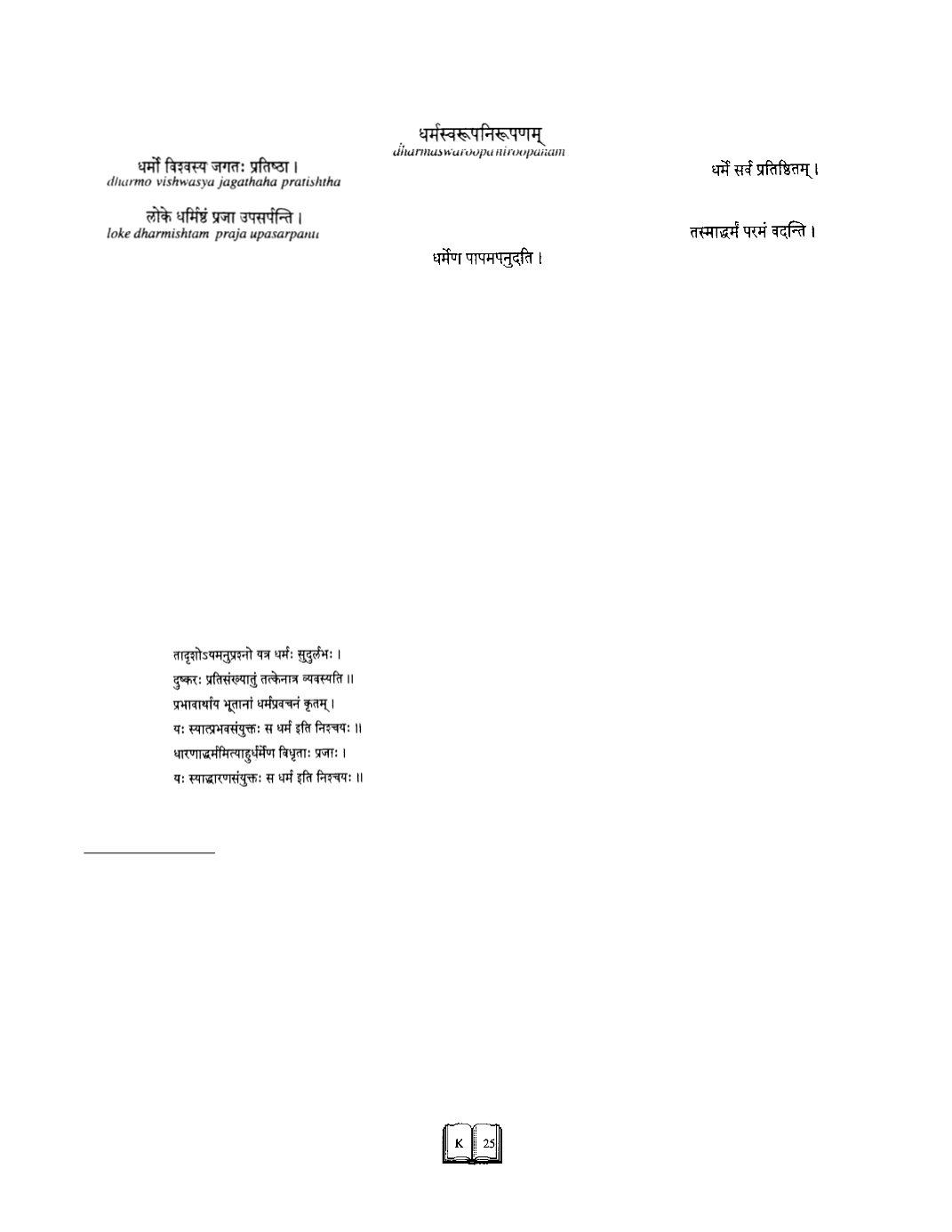

Eternal India
encyclopedia
D HARM A
Ancient Concepts, Sciences & Systems
dharmena papamapanudathi
dharme sarva prathishtitham
Dharma constitutes the foundation of all affairs in the world. People respect one who adheres to Dharma.
Everything in this world is founded on Dharma. Dharma, therefore is considered Supreme.
Hindu jurisprudence or the legal system
(Vyavahara
Dhar-
masastra) is embedded in Dharma as propounded in the
Vedas,
Puranas, Smritis
and other works on the topic. Dharma is a
Sanskrit expression of the widest importance. There is no corre-
sponding word in any other language. It would be also futile to
attempt to give any definition of the word. It can only be explained.
It has wide varieties of meaning. A few of them would enable us to
understand the width of the expression. For instance, the word
Dharma is used to mean Justice (
Nyaya
), what is right in a given
circumstance, moral, religion, pious or righteous conduct, being
helpful to living beings, giving charity or alms, natural qualities or
characteristics or properties of living beings and things, duty, law
and usage or custom having the force of law, and also a valid
Rajashasana
(royal edict).
The
Mahabharata
contains a discussion on Dharma. On being
questioned by Yudhistira about the meaning and scope of Dharma,
Bhishma states:
s
;
It is most difficult to define
Dharma. Dharma
has been explained to be that
which helps the upliftment of living beings. Therefore that which ensures
welfare (of living beings) is surely Dharma The learned rishis have declared
that which sustains is
Dharma.
________________________________________________
Manu states that the force behind every action of a human being
is his desire (
kama).
The next question is what are the natural
desires of man. The natural desire of man was found to be the
desire to have sexual and emotional enjoyment and wealth i.e.
material pleasure and (
artha
). Artha is explained by Vatsayana as
connoting material pleasure such as gold, com, including education
or knowledge necessary to earn wealth. The source of all evil
actions of human beings was traced to the desire for material
pleasure which in turn gave rise to conflict of interests among
individuals.
Further it was found that the desire
{kama)
of human beings
could also be influenced by other impulses inherent in human beings
such as anger (
krodha
), passion (
moha
), greed (
lobha
), infatuation
(
mada
), and enmity (
matsarya)
After degp study and meditation, the great seers declared that
unless
kama
(the desire) to have all earthly i.e. material pleasure
(artha)
and those proceeding from anger, greed, passion, infatu-
ation and enmity of every individual is controlled by rules and not
the strength or weakness of the individual human beings, incessant
conflict, fight and consequential loss of happiness, peace as also
the loss of material pleasure itself would be the inevitable conse-
quence. It is for this purpose that the rules of Dharma were
expanded to cover all aspects of life. It is thus that the whole body
of rules, which declared as to what were the proper desires which
one should entertain and also what were the proper ways and
means to acquire the material pleasure properly desired, came to be
known collectively as Dharma.
DEFINITION OF LAW
Having evolved the concept of enforceability of law through the
institution of kingship, ancient Hindu jurists proceeded to define the
law. Law was recognised as a mighty instrument necessary for the
protection of individual rights and liberties. Whenever the right or
liberty of an individual was encroached by another, the injured indi-
vidual could seek the protection of the law with the assistance of
the king, however powerful the opponent (wrongdoer) might be.
The power of the king (State) to enforce the law or to punish the
wrongdoer was recognised as the force (sanction) behind the law
which could compel implicit obedience to the law. After declaring
that
Kshatra
power i.e. the king, was created by the creator the
Brihadaranyaka Upanishad proceeds to state, finding that the mere
creation of kingship was not enough, the most excellent Dharma
(law), a power superior to that of the king, was created to enable
the king to protect the people and gives the definition of law as
follows: Law is the king of kings. Nothing is superior to law. The
law aided by the power of the king enables the weak to prevail over
the strong.
Commenting on the above provisions Dr. S. Radhakrishnan ob-
serves: “Even kings are subordinate to Dharma, to the rule of
law.”
Therefore declaration of law by a political superior or sovereign
(the king) and the availability of the power of the State machinery
for enforcement of that law are stated to be the essential requisites
of an imperative law. The law as defined in Hindu jurisprudence
also meant that it was enforceable against individuals with the aid
of the physical power of the king. The power of the king constituted
the instrument of coercion. This aspect is forcefully put by Manu
tasmaadharmam paramam vadanthi
















